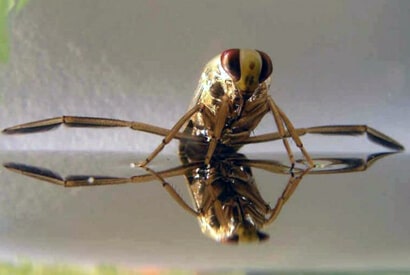Chemicals from a Mosquito Predator May Be Used to Control Them August 26, 2016 by Entomology Today 2 Comments 
A backswimmer. Photo by E. van Herk.
For decades, people have used a biological pesticide called Bacillus thuringiensis israelensis (Bti) to control mosquitoes and other insects. Bacillus thuringiensis is a bacterium that produces a protein that is toxic to insects, but is safe for humans. Organic farmers spray it on their crops in powder form, and modern plant breeders have inserted genes from the bacterium into corn and other crops to make them resistant to certain insects.
Now researchers have shown that chemical substances emitted by one of the mosquito’s natural enemies can make the biological pesticide Bti even more effective. Water bugs in the family Notonectidae, known as backswimmers because they swim on their backs, eat mosquito larvae, and while doing so, they emit “predator cues” that impair the mosquito’s immune system.
According to scientists at the University of Leuven in Belgium, a cocktail made of synthetic predator cues and Bti could be the future of mosquito control. Their research is published in Ecological Applications.
“We already knew that chemical substances emitted by the backswimmer — a natural enemy of mosquito larvae in the water — trigger a stress response in mosquitoes,” said Lin Op de Beeck, one of the co-authors. “This stress response, in turn, suppresses the mosquito’s immune system. Scientists have recently found a way to produce a synthetic version of these chemical substances known as predator cues. We discovered that this synthetic version triggers a stress response in the mosquitoes and impairs their immune system, just like the natural predator cues.”
This gave the researchers the idea to combine the synthetic predator cues with the biological pesticide Bti.
“We developed a cocktail of predator cues and a low, non-lethal dose of Bti,” Op de Beeck said. “The predator cues trigger extra stress, so that the Bti had a strong impact despite its lower dose. As a result, the mortality rates among mosquitoes were high.”
Since the predator cues of the backswimmer also have an impact on the mosquito’s immune system, even if the cocktail does not kill the mosquito larvae, it still weakens them.
“The surviving mosquitoes and mosquito larvae will probably have a shorter lifespan, so that the parasites they transmit don’t have the time to complete their incubation period,” said Op de Beeck. “As a result, the mosquitoes will transmit [fewer] diseases.”
An additional advantage of this combined strategy is that the synthetic predator cues of the backswimmer are not difficult to produce, making the production of the Bti cocktail relatively easy and cheap.
Read more at: